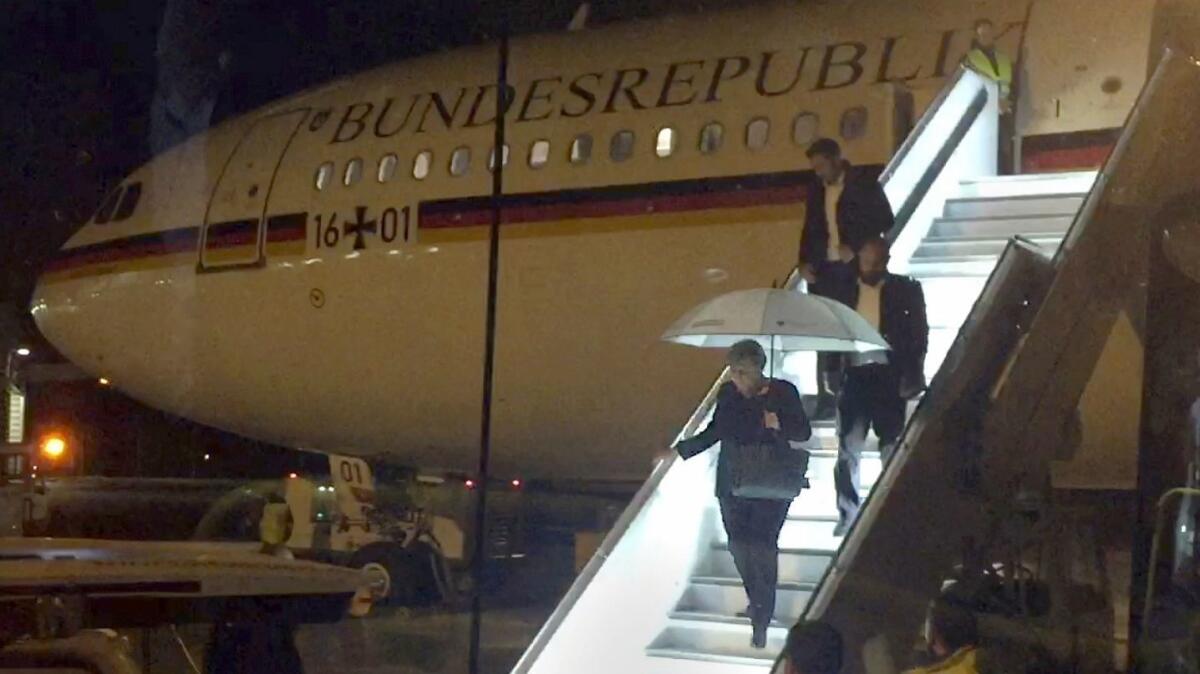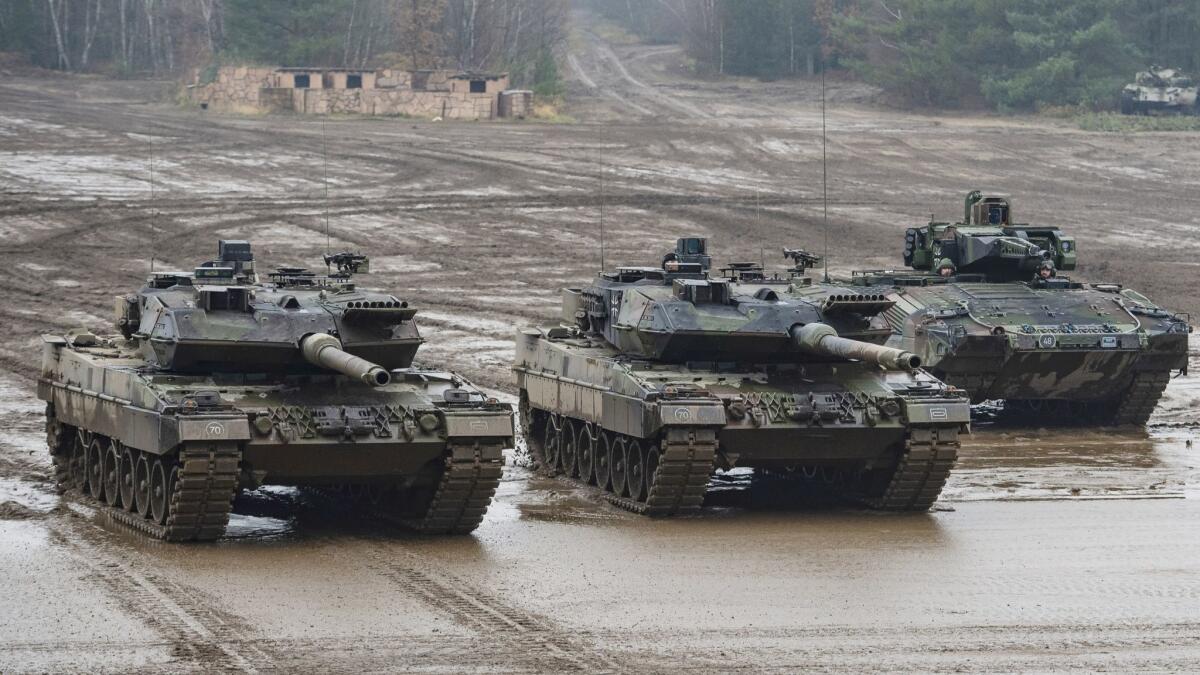Germany faces an awkward struggle to build and maintain its armed forces

- Share via
Reporting from Berlin — German Chancellor Angela Merkel had taken off for an international meeting in Buenos Aires in November when the electronics systems on her Luftwaffe jet abruptly failed, forcing the pilot of the 20-year-old government craft to make an emergency landing in Cologne and Merkel to switch to a commercial flight.
A month later, President Frank-Walter Steinmeier and a 55-member delegation were stranded in Ethiopia for three hours when the same Airbus A340 was grounded due to technical problems.
There may be no better illustration of Germany’s awkward struggle to rebuild and refurbish its armed forces — after nearly three decades of deliberate post-Cold War shrinking — than the embarrassingly long list of breakdowns that have plagued its No. 1 air force jet, the Theodor Heuss.
“The armed forces have been neglected for far too long,” former Defense Minister Volker Ruehe, who retired in 1998, said in an interview. “We need to do more for our defense and take on more of the burden in Europe.”
A country that developed a pacifist streak as a reaction to its militaristic past and especially the devastation its forces caused under Hitler in World War II, Germany has frequently drawn the wrath of President Trump for its defense spending. All NATO members pledged to raise their national defense spending, at a 2014 summit in Wales in the wake of Russia’s annexation of Crimea, to 2% of their gross domestic product.
Germany, the 29-nation alliance’s second largest member, will fall far short of that target with defense spending climbing from 1.24% in 2018 to 1.5% in 2025. By comparison, the United States spends 3.3% of its GDP on defense.
Merkel has said the country will reach the 2% target but has not provided a date for meeting the goal.
There could be further Germany bashing this weekend at the Munich Security Conference, an annual gathering where Vice President Mike Pence and a large delegation from the United States including House Speaker Nancy Pelosi (D-San Francisco) and Sen. Lindsey Graham (R-S.C.) will meet top security officials from across Europe.
Ruehe, who was defense minister for more than six years, recently criticized his successors for “destroying” the armed forces, known as the Bundeswehr, by slashing spending, abolishing the draft in 2011 and cutting troop strength from 340,000 in 1998 to the current level of 180,000. “We’ve had a lack of leadership and not enough appreciation for the soldiers,” he said.
Many North Atlantic Treaty Organization members will be at or above the 2% threshold by the agreed target date 2024. But Germany, a country deeply scarred by the horrors of its 20th century belligerency and later divided by the Cold War, has been a prominent straggler despite West Germany having benefited more during the decades of East-West confrontation from NATO’s collective defense system than any other. It has been criticized by other allies for its reluctance to give up its “peace dividend,” the steep reduction in defense spending that followed the collapse of the Berlin Wall in 1989.
Even though the government has posted growing budget surpluses over the last six years, Germans appear to have little appetite for rebuilding its military — despite a ratcheting up in pressure from the U.S. and European allies. Germans want to see more funding for schools and infrastructure projects than for defense, analysts say.
“I can totally understand the frustration in the United States but also in France and Poland as well,” said Claudia Major, a senior associate and defense analyst at the German Institute for International and Security Affairs in Berlin.
“They ask, ‘How can a rich country like Germany spend so little on its own defense?’” she added. “The main issue is that Germany doesn’t feel any military threat, and that limits their interest to invest in the armed forces’ readiness. Most politicians are uncomfortable talking about defense. You don’t win elections with it. It’s an issue to stay away from in Germany.”
Still, she noted, Germany is raising spending appreciably — from $44 billion in 2018 to $48.5 billion in 2019 and a projected $67 billion in 2025. In 2014, its defense budget was $38 billion. An opinion poll by YouGov last year found 60% of Germans opposed to increased defense spending.
Along with the reliability woes of air force jetliners, only about a third of Germany’s 128 Eurofighter jets are combat ready and just a quarter of its 130 army helicopters are operational, mainly because of shortages of spare parts. Only one of six submarines and fewer than half of 244 Leopard tanks are working, according to a recent report to Parliament.

“We need to have a minimum level of deterrence but that’s not at the level it should be,” said Hans-Peter Bartels, the parliamentary ombudsman for the armed forces whose damning report on the state of the Bundeswehr’s readiness lamented the diminishing level of troops since the end of the draft. “We need to do more. From my point of view, it’s taking too long.”
While Merkel, Defense Minister Ursula von der Leyen and most other conservatives would like to boost spending along the lines they signed up for in 2014, their junior coalition partners, the center-left Social Democrats, are opposed. Also known by its initials as the SPD, the party has long been leery of increased defense expenditures.
“The government is trying to live up to the investment pledge we made at the Wales summit,” said Peter Beyer, a member of Parliament for the conservatives and the German government’s transatlantic coordinator in the Foreign Ministry. “We want to be a reliable partner in NATO. We understand we need to do more. But it’s difficult with the coalition partner.”
Beyer, due to attend the Munich Security Conference, also noted that Germany’s defense budget has increased considerably in the last four years and would continue expanding strongly in the next six years. He also confirmed media reports this week that the Defense Ministry would be acquiring a new Airbus A350 jet later this year and two more next year, for transporting top government ministers and officials.
“That was a wake-up call,” Beyer said of the string of breakdowns that caused problems for Merkel and others. “As the strongest economy in Europe, Germany clearly needs workable modern aircraft and a reliable fleet to bring the chancellor and ministers to meetings around the world. It’s a wise and smart decision.”
Kirschbaum is a special correspondent.
More to Read
Sign up for Essential California
The most important California stories and recommendations in your inbox every morning.
You may occasionally receive promotional content from the Los Angeles Times.










